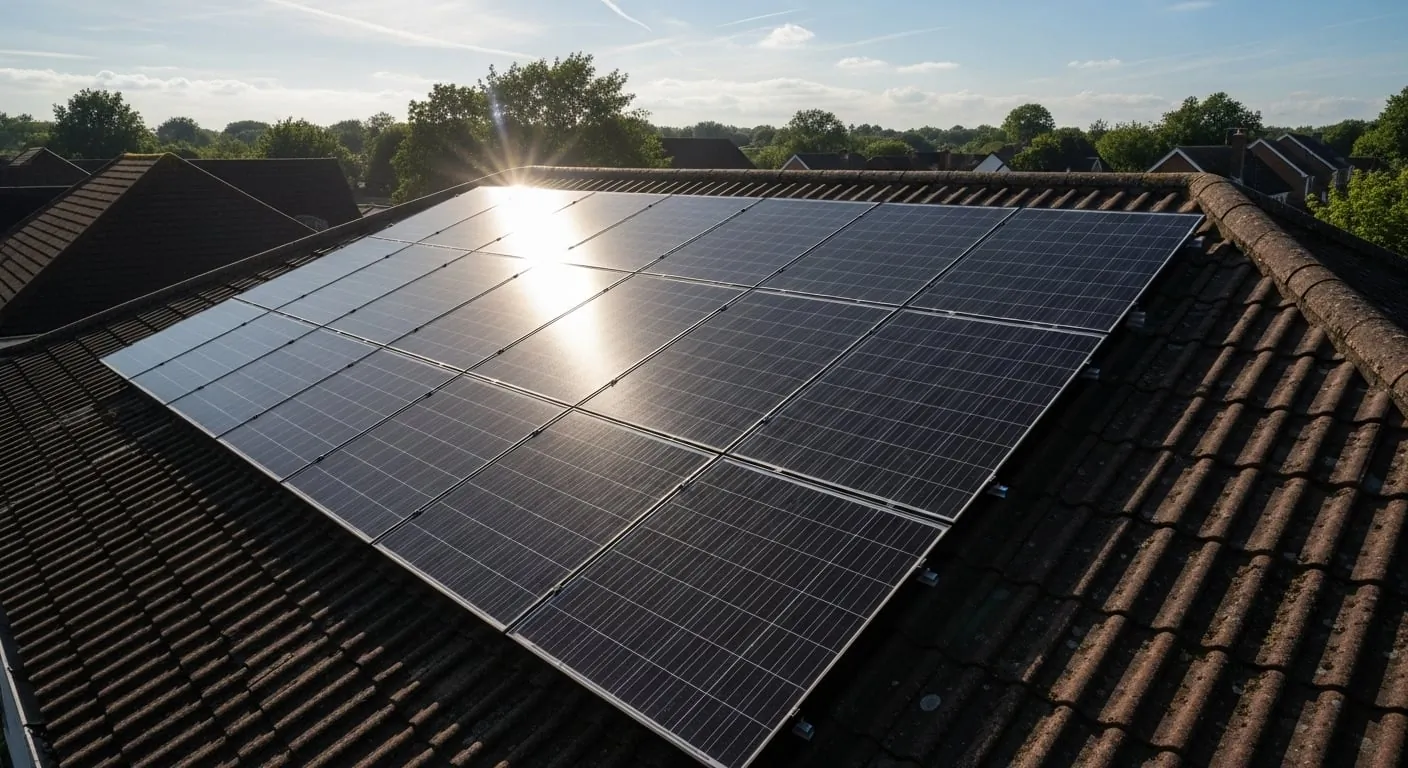Housing solar panels are becoming more popular in the UK as homeowners seek sustainable energy solutions and protection from rising electricity costs. This comprehensive guide explores how solar panels can transform your home into an energy-efficient powerhouse while contributing to a greener future.
How Solar Panels Work for UK Homes
Solar panels convert sunlight into electricity using photovoltaic cells. Even in the UK's variable climate, modern solar technology efficiently generates power:
- Direct sunlight: Maximum energy production
- Cloudy days: Still generate 10-25% of peak capacity
- Diffused light: Modern panels capture energy effectively
- Year-round operation: Producing electricity even in winter
- Average savings: 50-70% on annual electricity bills
- Protection from energy price increases
- Reduced reliance on grid electricity
- Predictable energy costs for decades
- Zero emissions during operation
- Reduce household carbon footprint by 1.3-1.8 tonnes CO2 annually
- Support UK's net-zero targets
- Minimal maintenance required
- Sell unused electricity back to the grid
- Rates of 5-15p per kWh exported
- Additional income stream
- No limit on export volumes
- Roof characteristics: Size, orientation, pitch, and structural integrity
- Shading analysis: Impact of trees, buildings, or other obstructions
- Energy consumption: Review of your electricity usage patterns
- Available space: For inverter, meter, and optional battery storage
- Optimal panel configuration
- Inverter selection and placement
- Wiring routes and electrical connections
- Integration with existing systems
- Safe, compliant installation
- Minimal disruption to your home
- Typically completed in 1-2 days
- Full system commissioning and testing
- System size (2kW-5kW typical)
- Panel quality and efficiency
- Roof complexity
- Additional components (optimisers, monitoring)
- Faster payback with higher electricity usage
- Accelerated by rising energy prices
- Extended system life of 25+ years
- Continued savings after payback
- Interest-free loans available
- Green mortgages with preferential rates
- Rent-a-roof schemes
- Outright purchase for maximum returns
- Mandatory for energy suppliers
- Payment for exported electricity
- Various tariff options available
- Stackable with bill savings
- Support for energy efficiency improvements
- Potential grants for qualifying households
- Reduced installation costs
- Focus on fuel poverty reduction
- For solar thermal systems
- Quarterly payments for 7 years
- Based on renewable heat generation
- Closing to new applications soon
- Finance improvements through energy savings
- No upfront costs required
- Repayments through energy bills
- Assessment determines eligibility
- LED lighting throughout
- A-rated appliances
- Smart home technology
- Efficient heating controls
- Store excess daytime generation
- Use solar power in evenings
- Backup during power cuts
- Increase self-consumption to 80%+
- Run appliances during daylight hours
- Use timers and smart plugs
- Charge devices when sun shines
- Heat water during peak production
- Increase home value by 4-5%
- Improve EPC rating
- Attract eco-conscious buyers
- Demonstrate lower running costs
- Future-proof against regulations
- Generate power from daylight, not just sunshine
- Perform well in cooler temperatures
- Rain naturally cleans panels
- Proven technology with millions installed
- East/west roofs still viable
- Ground-mounted systems available
- Flat roof mounting systems
- Building-integrated options
- Long-term savings exceed costs
- Protection from rising energy prices
- Various financing options
- Environmental benefits invaluable
- Annual visual inspections
- Occasional cleaning if needed
- Inverter replacement after 10-15 years
- Panels last 25-30+ years
- Performance warranties standard
- Improved panel efficiency
- Integrated battery systems
- Smart energy management
- Vehicle-to-home technology
- Community solar schemes
- Current and future energy needs
- Roof suitability and orientation
- Available budget or financing
- Environmental priorities
- Long-term home plans
- Free home assessments
- Detailed system proposals
- MCS-certified installation
- Comprehensive warranties
- Ongoing support and monitoring
The Benefits of Housing Solar Panels
1. Significant Energy Bill Savings
Installing solar panels on your home can dramatically reduce electricity costs:2. Clean, Renewable Energy Generation
Solar panels provide environmental benefits:3. Income Through Smart Export Guarantee
The SEG scheme allows you to earn from excess energy:The Solar Panel Installation Process
Initial Home Assessment
Professional installers evaluate:System Design
Tailored to your specific needs:Professional Installation
MCS-certified installers ensure:Understanding the Costs
Initial Investment
Typical residential systems cost £4,000-£9,000, depending on:Payback Period
Most UK homeowners see returns in 9-12 years:Financing Options
Making solar accessible:Government Incentives and Support
Smart Export Guarantee (SEG)
Energy Company Obligation (ECO)
Renewable Heat Incentive (RHI)
Green Deal Scheme
Maximising Your Solar Investment
Use Energy-Efficient Appliances
Reduce overall consumption:Consider Solar Battery Storage
Enhance your solar system:Time Energy Use Strategically
Match consumption to production:Solar Panels and Property Value
Installing solar panels can:
Common Concerns Addressed
"UK Weather Isn't Suitable"
Modern panels work efficiently in UK conditions:"My Roof Isn't Perfect"
Solutions exist for various situations:"Too Expensive"
Consider the full picture:Maintenance and Longevity
Solar panels require minimal upkeep:
The Future of Housing Solar Panels
Emerging trends include:
Making the Decision
Consider these factors:
Professional Guidance
CRG Direct offers:
Conclusion
Housing solar panels represent a smart investment in your home's future. With proven technology, attractive returns, and significant environmental benefits, solar panels offer UK homeowners a path to energy independence and sustainable living. As electricity prices continue rising and technology improves, the case for solar becomes ever stronger.
Ready to explore solar for your home? Contact CRG Direct today for a free, no-obligation assessment. Our experts will design a system perfectly suited to your home, ensuring maximum benefits from your solar investment. Join thousands of UK homeowners already enjoying the benefits of clean, affordable solar energy.
